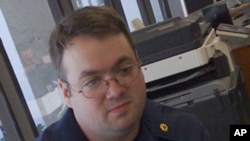Haitians struggling in the aftermath of last month's earthquake have been turning to cell phone text messages and Internet postings to reach out for help. The U.S. Coast Guard has been mining data from those sources to direct aid to those in need.
From a pair of computer screens in downtown Miami, Coast Guard volunteer Ryan Bank can survey the needs and the despair of Haitians in the wake of the January 12th earthquake.
"A school has 110 children trapped ... I have four children. My house is destroyed. I'm hungry. I'm asking you to help me please," he read some text messages. Those are just some of the 18,000 messages that have come into the offices of the Coast Guard's Haiti operation in Miami. Bank manages the tiny operation, scanning text messages and online services like Twitter and personal blogs.
In the days after the quake, Haitian cell phone users were unable to make phone calls, but they could send text messages and access some Internet services. As soon as those messages started coming in after the quake, Bank says he saw an opportunity. "The Coast Guard is here to save lives. And I was able to use this incredibly common and popular technologies to save lives and to help people," he said.
As a volunteer member of the Coast Guard, Bank does not get paid for the month of work he has put in so far. But he leads a growing operation that includes Haitian translators working from computers around the country, and a system to forward information to military and civilian aid crews in Haiti.
"We go through the State Department, USAID, and other agencies who are coordinating where aid goes. If it's an urban search and rescue team that needs to be dispatched, if it's MedEvac. There are a lot of resources we can call on," said Bank.
In the days after the quake, the United States also teamed with Haitian cell phone providers to dedicate a special number to receive text messages from Haitians in need. Haitians now can send a text to 4636 to ask for food and water, or to report the location of injured people.
As the recovery effort has evolved, reports of people trapped in rubble has dropped off, and more people are asking for relief supplies or reporting large groups of people in need.
In the past week, Bank received a puzzling series of text messages that suggested about 3,000 people had gathered in an area outside of Port-au-Prince. When the Haitian translators called some of the people, Bank said they confirmed the information and forwarded the details for aid crews to respond.
"These people said they were dying left and right of starvation, disease, other injuries. It's preliminary at this point, so we don't know all of the outcome [of relief efforts], but do know there is one," he said.
The traditional mission of the Coast Guard has been to find and rescue people in need, but the method Bank uses is only possible through the latest technology. Cell phones with text and Internet features are cheap and available to many Haitians. Internet tools allow Haitian translators to work from almost anywhere, processing information as quickly as possible. And rescuers can access online maps of Port-au-Prince to pinpoint the location of people in need.
Bank says the Coast Guard and aid agencies are still exploring ways to use the technology. "We're all trying to figure out what can we do with this. It's exciting to see where we go as it moves into a long-term recovery operation. And what can we do with this for the next disaster," he said.
He says one possibility is to begin processing other reports from Haitians to pass on to aid groups and other non-governmental organizations working on relief operations.




